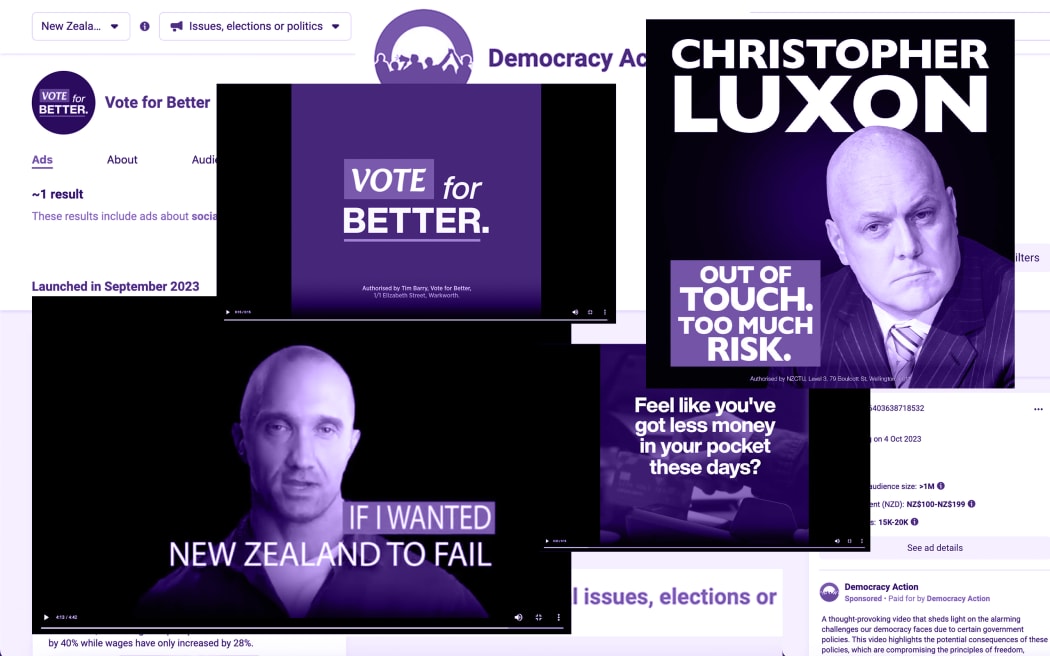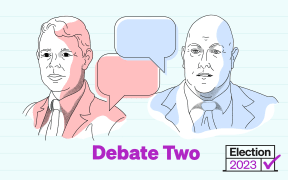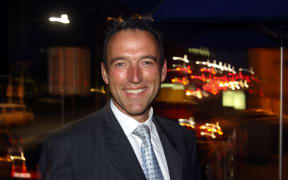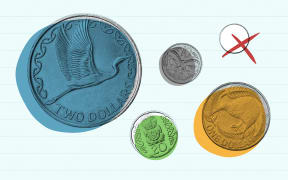
Photo: RNZ
Publicity-shy 'promoters' are spending thousands trying to influence the election. Some of the most active are new to politics, another promoter is a wealthy foreign businessman.
If you've been on YouTube, Facebook or Instagram and heard a robot-like voice talking about election issues, it may have come from a group called Vote for Better.
The group, which is new to politics, has spent between $80,800 and $118,800 on ads about the election campaign on Facebook and Instagram alone in recent weeks.
Vote for Better hasn't pushed for any particular party but its advertising is focused on critiquing the current government's performance. Some of its video ads are narrated with an American-accented artificial intelligence (AI) voiceover.
A typical ad claims that tax paid per New Zealander has increased 40 percent between 2017 and 2023 while wages have increased by 28 percent in the same period. The figures are based on tax paid by all people, including non-New Zealanders.
NZ Initiative chief economist Eric Crampton said there were better ways of calculating the tax burden. The claim was accurate though because it specified "per" New Zealander rather than "by".
Tim Barry, who fronts the campaign, would not be interviewed. In an email, he said Vote for Better was a non-partisan campaign.
"I am not doing any interviews, I'd prefer to let the data speak for itself," he said.
More on the political donations:
There are 31 entities like Barry's group registered with the Electoral Commission to push their messages during the election campaign. Any person or entity anticipating spending more than $15,700 on election-related advertising during the three months leading up to election day must be registered. They can spend up to a maximum of $391,000.
Jim Grenon is another publicity-shy promoter.
"I appreciate you are just doing your job but I am only willing to providing [sic] information on this as legally required, which I have done," he emailed in reply to RNZ's request for information.
Business Desk reported Grenon is linked to the NZ News Essentials website, which is dedicated to attacking the Government. Grenon is a Canadian private equity tycoon who made headlines in Canada when he shifted $68.2m to New Zealand while involved in court action with Canada's tax agency.
Another promoter, the S.B. Group, did not reply to RNZ's request for information. It published a full page ad in the Northern Advocate sending people to votewise.nz. The website, which is now hidden behind a password, encouraged voters to support New Zealand First's Northland candidate Shane Jones.
Glenn Inwood is the S.B Group's named representative. He was a former journalist and producer of RNZ's Morning Report. He also worked as a lobbyist for Japanese whaling and tobacco interests. He told Sean Plunket on The Platform that he has known Shane Jones for 25 to 30 years but would not reveal where the money which has funded the S.B. Group's advertising came from. Inwood has also been linked to the anti-vaccine mandate movement.
Inwood's S.B. Group was identified as the promoter on several ads run in the NZ Herald newspaper from the Natural Health Alliance. The advertisements encouraged people to give their party vote to New Zealand First. On September 13, the Natural Health Alliance was also approved as a registered promoter.
If ads promote a certain party or candidate, written permission from the party or candidate must be obtained and the money spent counts towards both the promoter and the party or candidate's spending limits ($1.3m for each party and $32,600 for each candidate). The cost of ads that attack other parties or policies only count towards the registered promoter's spend.
A spokesperson from the Electoral Commission said it had received no complaints about S.B. Group's advertisements in the New Zealand Herald, but that a complaint had been made about the votewise.nz website promoting Shane Jones.
"We followed up with S.B. Group and the website was made inactive soon after. Based on the limited time the website was up and the low number of views, and the proactive response from the promoter no further action has been taken on this matter," the spokesperson said.
Third party promoter rules
Political parties need to disclose where large donations come from; groups like Vote for Better and S.B. Group don't.
Victoria University of Wellington senior research fellow Max Rashbrooke said this represents a loophole in our system. "There is the potential, increasingly in the future for a large amount of dark money, essentially to be pushed in to attack ads and campaigns that are obviously aimed at swaying the election in a certain direction."
Tighter rules on the disclosure of donations to political parties took effect this year. Anybody donating more than $5000 to a political party is named. Rashbrooke said this could incentivise donating to third party groups instead of parties.
"The potential for undue influence can be a little bit like a balloon. If you squeeze down on it at one point, it just pops out somewhere else. And I think that's the case with the funding of politically active groups."
There's no limit on how many entities can register. Hypothetically, 1000 groups could register and spend $391,000 each attacking a party.
At this election, the 31 registered entities could spend a combined total of $12m.
"We know next to nothing about where the money comes from. That could be funding that represents a very particular vested interest, a very strong commercial interest. But we would have next to no visibility of that," said Rashbrooke.
While there is no transparency about where the money comes from, after the election some light can be shed on how much money was spent. Registered promoters who spend more than $100,000 must submit an expense return which the Electoral Commission publishes. However, if the promoter spent $99,999 there's no requirement for an expense form to be submitted.
In many cases, the only publicly available window into spending comes from data published by Meta on political advertising on its Facebook and Instagram platforms. Currently this puts Vote for Better at the top of the spend rankings of registered promoters.
Other registered promoters
On the Electoral Commission's web page of promoters, some names are familiar. Unions pepper the list, including the Council of Trade Unions, which has run attack ads saying National leader Christopher Luxon is out of touch, as well as the Maritime Union, the Dairy Workers Union, the NZEI which represents people in the education sector, the Nurses Organisation, E tū and the Public Service Association.
There's also well-known groups that focus on specific issues. The Taxpayers' Union, Hobson's Pledge, Family First, Julian Batchelor's 'Stop co-governance' and Groundswell are among the issue-based groups. They're joined by the likes of Greenpeace, Forest & Bird, ActionStation, Oxfam Aotearoa, and animal advocacy group Safe.
There's a smattering of industry associations. The Motor Trade Association told RNZ it anticipated spending up to $100,000 on advertisements. To date Facebook estimated it has spent between $2500 and $34,081. The Natural Health Alliance is listed, but did not respond to RNZ's request for information.
'Democracy Action' lists the Treaty of Waitangi, the inclusion of tikanga Māori in the legal system and "the rewriting of New Zealand history" as threats to democracy. Its Facebook ads use what appear to be AI personas of varying ethnicities. To date, it has spent a modest $400 to $800 on Facebook ads since July 14.
Other groups include climate action group Generation Zero, the Better NZ Trust which is campaigning on the clean car discount, Tax Justice Aotearoa New Zealand, which is in favour of taxes which target wealth and Every Kiwi Vote Counts, which is encouraging citizens living abroad to vote.







